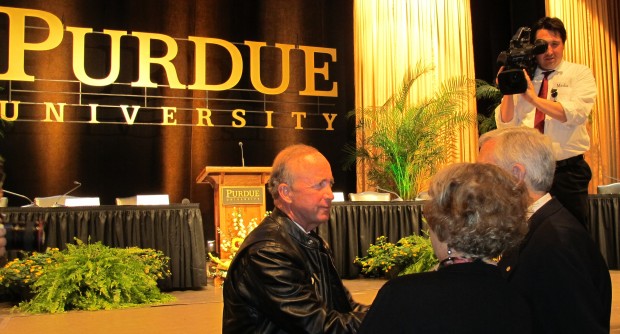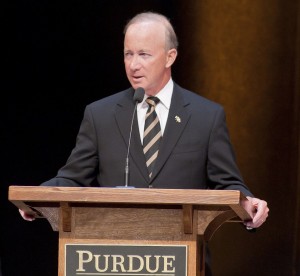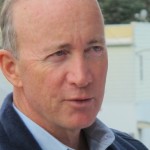Daniels Will Have To Win Over Purdue's Faculty, Who Wanted An Academic

Elle Moxley / StateImpact Indiana
Gov. Mitch Daniels accepts congratulations after the Board of Trustees announced he would be the next president of Purdue University.
Trustee Michael Birck says when the news leaked that Gov. Mitch Daniels was headed to Purdue, the alumni response was tremendous.
“I was thoroughly amazed and exceptionally pleased at how many alumni contacted me by email saying, ‘We hope this is true. This is our candidate,’” says Birck, who has has a degree from Purdue and represents the alumni association. “The number was enormous. And I’m very happy to report that.”
The Board of Trustees voted unanimously last week to make the governor Purdue’s next leader. Michael Berghoff, who chaired the search committee, says Daniels’ name came up early in the process and the governor remained a frontrunner throughout.
But after the fanfare in West Lafayette died down, reaction to the news has been mixed. Some have lauded Daniels, saying he’s been an effective governor and will bring much-needed fiscal leadership to Purdue. But others say Daniels lacks the academic credentials to lead a major research university.
- Purdue Faculty Wanted President To Be An AcademicStateImpact Indiana‘s Elle Moxley reports on what the governor’s selection will mean for the university and for higher education in the state.Download
‘You Were Picturing Some Ph.D., Award Winning Researcher’
Carly Houlton is a student at Purdue North Central. She writes for the school newspaper, performs in a student improv group and is president of the Ecology Club. So when a search committee asked students at the regional campus in Westville who should lead the university system, Houlton attended a public meeting to weigh in.
Houlton is studying biology and plans to apply for veterinary school in the fall, so to get a leg up, she’s assisting a professor conducting research on crayfish. She says Purdue needs an academic at the helm if the school wants to continue attracting quality researchers like chemist Ei-ichi Negishi, who won a Nobel Prize.
“I have a hard time believing someone who has a bachelor’s degree and a law degree and a bunch of honorary degrees could work with people on that caliber,” Houlton says.
Survey Says Purdue Community Wanted An Academic
Some 7,000 members of the Purdue community responded to a survey ranking what credentials they thought were most important for the next president to have. Overwhelmingly, they wanted someone with qualifications equivalent to a full-time tenured professor.
Morris Levy, past president of the faculty senate, chaired of the special advisory committee that conducted the survey. He says the leader of a research university needs the kind of experience you only get in a classroom or laboratory.
—Dennis Barden, vice president of executive search firm Witt/Kieffer
“People should not take this as some kind of elitist model that, unless you have a Ph.D., you’re not qualified to work at Purdue,” he says. “But when you have a creative force of thousands of people, you have to know how they work, why they work and how to empower them to work.”
Levy says the governor’s track record on education doesn’t qualify him to lead a public university. In an open letter from the faculty senate, Levy criticized Daniels for among other things supporting a bill that capped bachelor’s degrees at 120 credit hours to promote on-time graduation.
“There are lots of reasons why students take more than four years,” he says. “Very little of that can be attributed to a curriculum that demands extraordinary time or a curriculum that has superfluous credits, which is the message we have from him.”
Levy says it’s disheartening that after the faculty senate conducted such an extensive survey — the first of its kind — the search committee decided to go another direction. He points out that the majority of the trustees were appointed by Daniels. None of them has worked in academia, either. But he says at least Daniels was candid when he admitted he faced a steep learning curve.
“I had to be dragged out here from a conversation with the faculty senate leadership, the first, I’m sure, of hundreds that will follow,” the governor said in West Lafayette last week. “I feel this is a very legitimate, natural concern people would have.”
To address it, Daniels says he’ll be working closely with Provost Tim Sands, who is leading the university as interim president until the governor leaves political office in January.
Why Politicians Might Be The Next University Presidents
Daniels is hardly the first politician to move from politics to academia, as StateImpact has reported. Increasingly, universities look for business and leadership experience, not necessarily academic credentials, says Dennis Barden, vice president of executive search firm Witt/Kieffer.
—Morris Levy, Purdue professor
“The job of the president has become increasingly external, increasingly focused on interactions with potential funders,” Barden says. “It’s becoming more of a true chief executive job.”
But Purdue alumni and West Lafayette resident Aaron Hoover disagrees that a businessman will be able to lead as well as an academic. Hoover teaches writing at Ivy Tech — he says the governor has done great things for the state’s community college system — but says he’s not a good fit for a research university like Purdue.
Daniels and I agree on one thing — a thriving university is really important to the economy of both the area where it is and the state it’s in. A university also provides a lot of social richness. Good, thriving universities are fundamental to the functioning of a democracy. They empower diverse kinds of people who otherwise wouldn’t be empowered. That’s what Purdue is to me — a chance to revitalize my community, my state socially. My deep worry about Daniels is he doesn’t see those missions of a university as important, he only sees the economic missions as important.
So Hoover has created a Facebook event protesting Daniels’ selection. He’s encouraging people to rally on the West Lafayette campus Saturday. More than 200 people have said they’ll attend.
Podcast: Play in new window | Download



